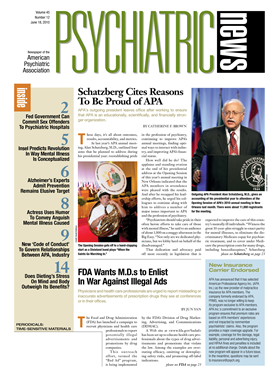The Food and Drug Administration (FDA) has launched a campaign to recruit physicians and health care professionals to report potentially illegal advertisements and promotions by drug companies.
This outreach effort, termed the “Bad Ad” program, is being implemented by the FDA's Division of Drug Marketing, Advertising, and Communications (DDMAC).
A Web site at <
www.fda.gov/badad> has been set up to educate health care professionals about the types of drug advertisements and promotions that violate the law. Among the examples are overstating efficacy, omitting or downplaying safety risks, and promoting off-label indications.
Drug companies are prohibited from discussing or promoting unapproved indications of their products, but it is not illegal for them to distribute articles published in peer-reviewed medical journals that investigate or review unapproved uses of a medication.
The FDA is encouraging physicians and other professionals to report suspected violations they encounter at medical conferences, in professional and lay media, in materials they receive, at company-sponsored presentations, and during sales-representatives' visits. Complaints can be submitted, with supporting materials or other evidence, to the agency by e-mail at
[email protected], telephone at (877) RX-DDMAC, or mail. The reports can be submitted anonymously, but the agency recommends that those filing a complaint provide their name and contact information for follow-up and collection of additional materials.
“This is a reasonable effort on the part of the FDA,” said David Fassler, M.D., APA treasurer and a child and adolescent psychiatrist in Vermont. He is also a clinical professor of psychiatry at the University of Vermont. “At a minimum, it may help educate physicians about the regulations governing ads and promotions.”
He suggested, however, that the initiative indicates the FDA's lack of resources when it comes to reviewing drug-marketing activities. “Improving compliance will ultimately require a substantial increase in the resources available for monitoring and enforcement,” he said.
The DDMAC, housed in the FDA's Center for Drug Evaluation and Research, is in charge of monitoring and regulating the advertisements and promotional activities for prescription drugs. Medical devices and over-the-counter drugs are not regulated by this division.
Although spontaneous reports from health care professionals have occasionally led to investigation and regulatory actions, the DDMAC has traditionally focused its reviews on advertising materials voluntarily submitted by drug companies, complaints filed by competitor drug companies, and surveillance of medical conferences. In a public letter posted on the Bad Ad program Web site, FDA Commissioner Margaret Hamburg, M.D., wrote that the “FDA's ability to monitor other promotional activities, which may occur in any number of settings, is limited.”
In 2009, the DDMAC issued 38 enforcement letters to pharmaceutical companies, up from 22 letters in 2008.
According to Hamburg's letter, the DDMAC will have exhibits at major medical conferences to educate physicians and others about drug-marketing regulations and to promote the Bad Ad program. She urged practitioners to assist the FDA in identifying and stopping misleading drug promotion.

